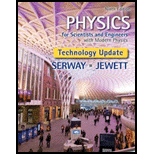
Concept explainers
One long wire carries current 30.0 A to the left along the x axis. A second long wire carries current 50.0 A to the right along the line (y = 0.280 m, z = 0). (a) Where in the plane of the two wires is the total magnetic field equal to zero? (b) A particle with a charge of −2.00 μC is moving with a velocity of
(a)
The location where total magnetic field is zero.
Answer to Problem 14P
The location where total magnetic field is zero is
Explanation of Solution
Given info: Current flowing through the first wire is
Formula to calculate magnetic field due to first wire is,
Here,
Formula to calculate magnetic field due to second wire is,
Here,
Total magnetic field given by both wire is,
Substitute
Substitute
Substitute
Thus, the location where total magnetic field is zero is
Conclusion:
Therefore, the location where total magnetic field is zero is
(b)
The magnitude of vector magnetic force.
Answer to Problem 14P
The magnitude of vector magnetic force is
Explanation of Solution
Given info: charge on particle on particle is
Formula to calculate total magnetic field is,
Substitute
Formula to calculate force acting on particle is,
Here,
Substitute
Hence, magnitude of vector magnetic force is
Conclusion:
Therefore, magnitude of vector magnetic force is
(c)
The magnitude of vector electric field.
Answer to Problem 14P
The magnitude of vector electric field is
Explanation of Solution
Formula to calculate electric field is,
Here,
Substitute
Hence, magnitude of vector electric field is
Conclusion:
Therefore, magnitude of vector electric field is
Want to see more full solutions like this?
Chapter 30 Solutions
Physics for Scientists and Engineers with Modern Physics, Technology Update
Additional Science Textbook Solutions
College Physics: A Strategic Approach (3rd Edition)
Genetics: From Genes to Genomes
Chemistry: Atoms First
Cosmic Perspective Fundamentals
Chemistry & Chemical Reactivity
Fundamentals Of Thermodynamics
- I need help with part B. I cant seem to get the correct answer. Please walk me through what youre doing to get to the answer and what that could bearrow_forwardQuestion 6: Chlorine is widely used to purify municipal water supplies and to treat swimming pool waters. Suppose that the volume of a particular sample of Cl₂ gas is 8.70 L at 895 torr and 24°C. (a) How many grams of Cl₂ are in the sample? ⚫ Atomic mass of CI = 35.453 g/mol • Molar mass of Cl₂ = 2 x 35.453 = 70.906 g/mol Solution: Use the Ideal Gas Law: Step 1: Convert Given Values • Pressure: P = 895 torr → atm PV= = nRT 1 P = 895 × = 1.1789 atm 760 • Temperature: Convert to Kelvin: T24273.15 = 297.15 K • Gas constant: R = 0.0821 L atm/mol. K Volume: V = 8.70 L Step 2: Solve for n . PV n = RT n = (1.1789)(8.70) (0.0821)(297.15) 10.25 n = = 0.420 mol 24.405 Step 3: Calculate Mass of Cl₂ Final Answer: 29.78 g of Cl₂. mass nx M mass= (0.420)(70.906) mass= 29.78 garrow_forwardE1 R₁ w 0.50 20 Ω 12 R₁₂ ww ΒΩ R₂ 60 E3 C RA w 15 Ω E2 0.25 E4 0.75 Ω 0.5 Ωarrow_forward
- What is the force (in N) on the 2.0 μC charge placed at the center of the square shown below? (Express your answer in vector form.) 5.0 με 4.0 με 2.0 με + 1.0 m 1.0 m -40 με 2.0 μCarrow_forwardWhat is the force (in N) on the 5.4 µC charge shown below? (Express your answer in vector form.) −3.1 µC5.4 µC9.2 µC6.4 µCarrow_forwardAn ideal gas in a sealed container starts out at a pressure of 8900 N/m2 and a volume of 5.7 m3. If the gas expands to a volume of 6.3 m3 while the pressure is held constant (still at 8900 N/m2), how much work is done by the gas? Give your answer as the number of Joules.arrow_forward
 Principles of Physics: A Calculus-Based TextPhysicsISBN:9781133104261Author:Raymond A. Serway, John W. JewettPublisher:Cengage Learning
Principles of Physics: A Calculus-Based TextPhysicsISBN:9781133104261Author:Raymond A. Serway, John W. JewettPublisher:Cengage Learning Physics for Scientists and Engineers: Foundations...PhysicsISBN:9781133939146Author:Katz, Debora M.Publisher:Cengage Learning
Physics for Scientists and Engineers: Foundations...PhysicsISBN:9781133939146Author:Katz, Debora M.Publisher:Cengage Learning Physics for Scientists and EngineersPhysicsISBN:9781337553278Author:Raymond A. Serway, John W. JewettPublisher:Cengage Learning
Physics for Scientists and EngineersPhysicsISBN:9781337553278Author:Raymond A. Serway, John W. JewettPublisher:Cengage Learning Physics for Scientists and Engineers with Modern ...PhysicsISBN:9781337553292Author:Raymond A. Serway, John W. JewettPublisher:Cengage Learning
Physics for Scientists and Engineers with Modern ...PhysicsISBN:9781337553292Author:Raymond A. Serway, John W. JewettPublisher:Cengage Learning College PhysicsPhysicsISBN:9781305952300Author:Raymond A. Serway, Chris VuillePublisher:Cengage Learning
College PhysicsPhysicsISBN:9781305952300Author:Raymond A. Serway, Chris VuillePublisher:Cengage Learning College PhysicsPhysicsISBN:9781285737027Author:Raymond A. Serway, Chris VuillePublisher:Cengage Learning
College PhysicsPhysicsISBN:9781285737027Author:Raymond A. Serway, Chris VuillePublisher:Cengage Learning





